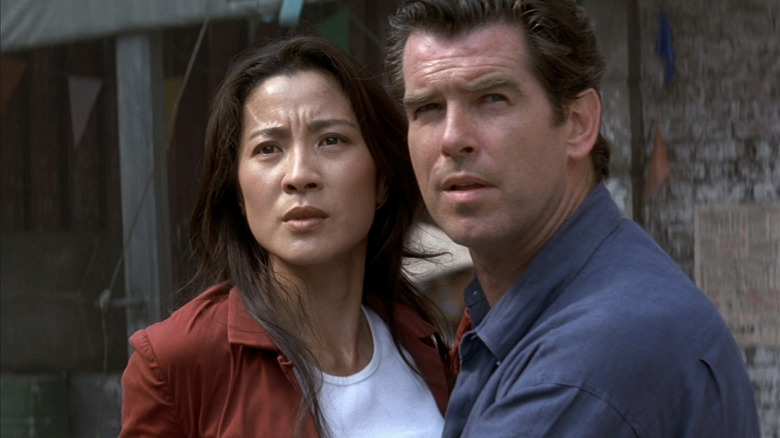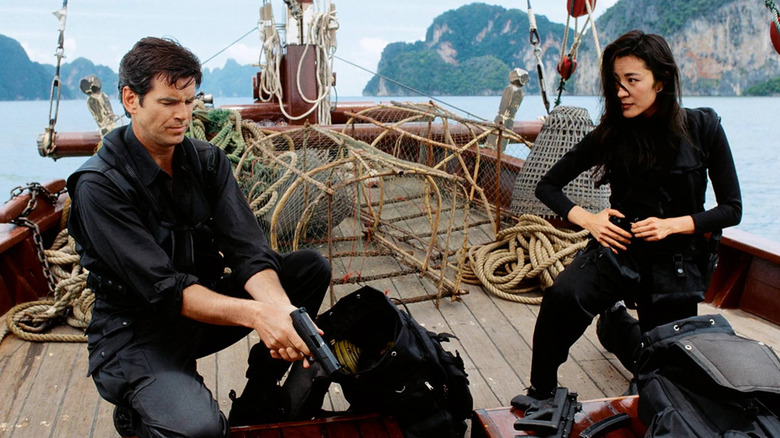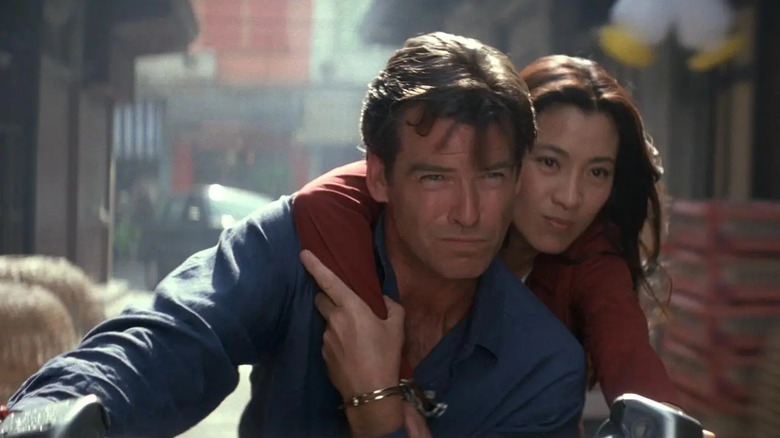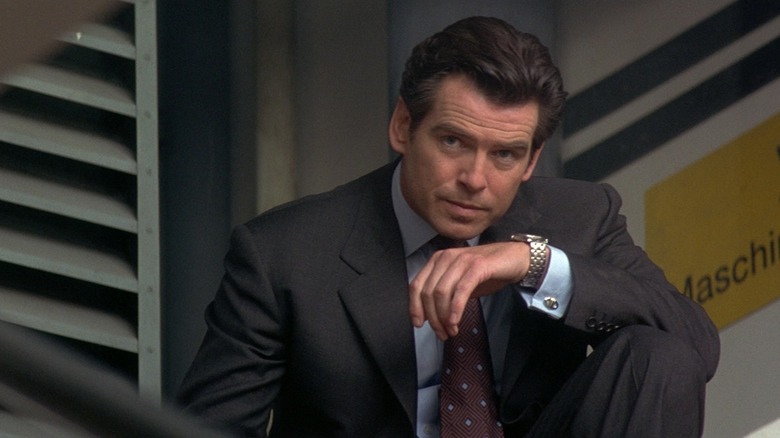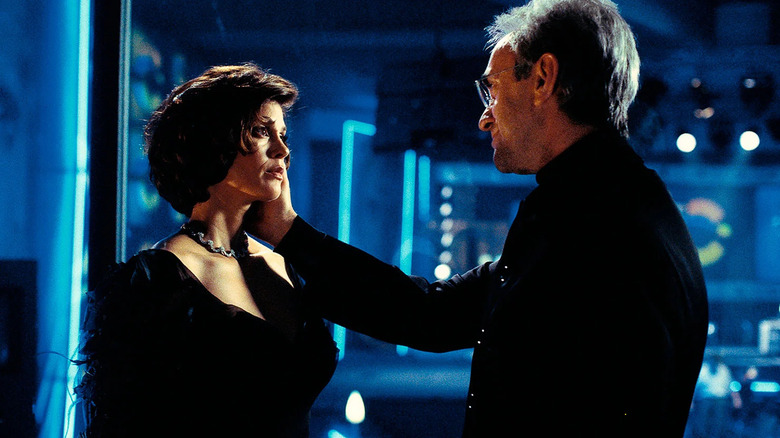James Bond Hired (Then Fired) A Legendary Star Trek Writer For Tomorrow Never Dies
To state a very true, indisputable thing right up front: Pierce Brosnan is the best James Bond (in my opinion). What's more, Martin Campbell's 1995 entry "GoldenEye" is one of the three best of all the James Bond movies, and Roger Spottiswoode's 1997 film "Tomorrow Never Dies" is nothing to sneeze at. Indeed, watching "Tomorrow Never Died" in 2023 posits an eerily accurate trajectory of the future computer technology, and its Steve Jobs-like villain Elliot Carver (Jonathan Pryce) easily predicts the culture of I'm-always-right tech-bros we currently find ourselves mired in.
Briefly, the villain in "Tomorrow Never Dies" seeks to digitally control the flow of information, making him a soft-spoken, cyber-jacked version of William Randolph Hearst. He aims to start a war between China and England, hoping to secure broadcasting rights in China for the rest of his life. In 1997, such a plot seemed both hopelessly nerdy and legitimately terrifying. The internet was still novel in the halcyon days of Third Eye Blind, and spy stories about the manipulation of cyberspace reflected real-life fears people actually had.
And to think, 007 fans might have had an expert "Star Trek" filmmaker on the case. In the 2020 book "Nobody Does It Better: The Complete, Uncensored, Unauthorized Oral History of James Bond" edited by Mark A. Altman and Edward Gross, it was revealed that Nicholas Meyer was invited to take a pass at the screenplay for "Tomorrow Never Dies." Meyer, Trekkies may know, was the writer/director behind "Star Trek II: The Wrath of Khan" and "Star Trek VI: The Undiscovered Country," as well as the writer of "Star Trek IV: The Voyage Home." You know, the good ones. Meyer talks about his lack of James Bond fandom, and his experience writing a draft of a 007 screenplay.
Nepotism
It should also be stated that one needn't be a member of the fan community in order to adapt a fan-favorite character to the big screen. Sometimes an outsider's perspective can offer a fresh take on something that could use exploration. So when Nicholas Meyer says that he doesn't much like James Bond, know that he took a writerly approach to the material and not a fan's approach. It also just so happened that he knew a lot of people on the inside and was willing to take advantage of professional and personal contacts to land a job writing a high-profile action picture. He said:
"I should state at the outset that I was never a fan of the James Bond franchise. I prefer my spy fiction less cartoonish, favoring Hitchcock and le Carré over Ian Fleming, therefore I cannot claim any sort of passion for the material. But I had three intimate points of contact with the film in question, which made it difficult for me to turn down the invitation to participate."
And who were the contacts? Meyer lays them out:
"In no special order, they were my friend and protégé, Jeff Kleeman, who was the UA executive on the film; my friend, the star, Pierce Brosnan, who I had directed on 'The Deceivers,' a Merchant Ivory production we shot together in India; and the director, my friend, Roger Spottiswoode, who is also my brother-in-law once removed (his brother is married to my sister, whom he met as the result of my longtime friendship with Roger)."
Is this nepotism? Yes. Does it much matter in this case? Not really. Meyer, a talented writer was ready to devote himself to the script.
Tomorrow Never Lies
Meyer revealed that the original title for the script was "Tomorrow Never Lies," which he preferred because it actually related to the plot of the movie. "Tomorrow Never Dies" is actually kind of a nonsense phrase, at least on par with "A View to a Kill." He also gave himself a creative mandate when it came to writing the film's villain, saying:
"The villain of the piece was inspired, like 'Citizen Kane,' by a certain newspaper baron ('Tomorrow' was the name of his flagship newspaper). The specific question we were all asked to address was, 'What does the villain want?' And, in an emphatic parenthesis, we were reminded, A. that previous Bond villains had already wanted the gold in Fort Knox, atomic weapons, control of the oceans, control of outer space, etc. And, B. 'Keep it simple.' I flew to London, pondering this question."
The aforementioned Jeff Kleeman went on record in "Nobody Does It Better" to say that Meyer, perhaps regrettably was brought on at a very awkward time during production. If he had been allowed to join at the very start, then he would have been able to assert more creative control. If they brought him in at the end, he could have at least served as a patch-up man, tightening scenes that already existed. It seems that Meyer's participation began when a lot of the story had been laid out and major changes couldn't be made.
Meyer, meanwhile, didn't recall the experience as being very positive either. He tried to throw out a lot of the current script, something that upset the Broccoli family, the masterminds behind the James Bond film series.
There's a reason why Meyer is not the credited screenwriter on "Tomorrow Never Dies."
The Rashomon effect
Meyer claimed that he was severely jet-lagged when he pitched his idea to Eon Productions and that his recollection of events may not be entirely accurate. Needless to say, he had some ambitious ideas that would take "Tomorrow Never Dies" in a new direction, ideas which he gave to a whole raft of executives.
He noted that James Bond films follow a very rigid pattern, which he recognized, beat for beat. "The James Bond films are as rigid in their format as an English sonnet," he noted. Meyer walked readers through the opening action scene, the song sequence, the scene where M is mad at 007, then the intro of the femme fatale, the travel to exotic locations, etc., etc. He waited for the perfunctory scene where the film's bad guy — whom he generically referred to as Mr. Big — reveals his plan. Here was Meyer's pitch:
"Now imagine all [the perfunctory scenes have] taken place and Mr. Big goes on to explain that everything that has happened thus far, all the attempts to kill Bond, etc., were a test to see if Bond was really the right man for the job Mr. Big has in mind. 'I think you will find,' he goes on to say, 'that fundamentally I'm a 'people person.' Meaningful pause. 'There's too many of them.' Pause for gasp from the room. Mr. Big then turns on all the monitors in his lair, and each reveals a horrifying instance of overpopulation, from famine in Ethiopia to gridlock in L.A."
So, it seems, the villain was concerned with overpopulation. Which is, as motivations go, a legitimate concern.
Overpopulation
Meyer continued:
"Mr. Big explains he's trying to address a planetary crisis no politician is even willing to mention. 'Even lemmings know what to do when they grow too numerous, do they not, Mr. Bond? 007, that's some kind of license, isn't it? Tell me, Mr. Bond, how much game are you allowed to bag with that license? Will you help me, sir? Will you help me to save planet Earth?' Mr. Big goes on to explain, in my spiel, that he wants to shrink Earth's population by starting a war between India and China, the two most populous nations on the planet, and Bond agrees to do this."
Meyer loved this scene, and he especially loved interrogating James Bond's license to kill. If he can murder under the auspices of the law, where are the limits? Would starting a war to curtail the Earth's population be ultimately righteous? Meyer liked the moral ambiguity of it. "It's not been done before," Meyer said in his pitch, "and it's simple." It's not a bad idea and it allows the audience to be sympathetic to the villain's thinking.
Meyer got a brief note the next day. "It's too serious," Barbara Broccoli told him. He was out. Meyer later reflected:
"That was my crash course in understanding how the Bond franchise worked. It was of crucial importance that nothing be real in the Bond stories; it was all about locations, action set pieces, and babes. How dense I had been not to perceive this! In my recollection, I made several other attempts to supply dialogue or scenes while I was in London, but all these were rejected and shortly thereafter I flew back to Los Angeles with my tail more or less between my legs."
Oh, what could have been.
